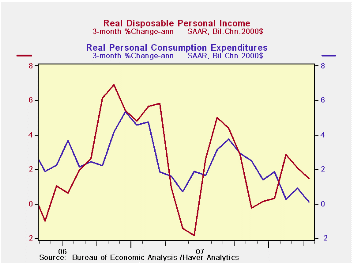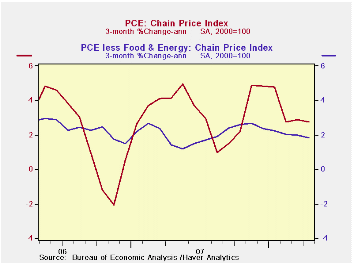 Global| May 30 2008
Global| May 30 2008U.S. Income & Spending Rose Moderately in April; Real Income Flat
by:Tom Moeller
|in:Economy in Brief
Summary
Nominal personal income rose 0.2% last month after a 0.4% March increase which was revised up slightly from the initial report. The April rise matched Consensus expectations. Nevertheless, slower growth in payrolls slowed the rise in [...]

Nominal personal income rose 0.2% last month after a 0.4% March increase which was revised up slightly from the initial report. The April rise matched Consensus expectations. Nevertheless, slower growth in payrolls slowed the rise in income to a three-month growth rate of 4.2% after the 6.2% increase during all of last year.
Disposable personal income also rose a moderate 0.2% during April. Adjusted for price inflation, however, real income fell just slightly after no change in March. As a result of this recent and earlier weakness, the 1.5% three-month growth rate in real DPI was roughly half of that during all of 2007.
The PCE chain price index matched expectations and increased 0.2% after a 0.3% rise in March. The core PCE price index also matched expectations and ticked up just 0.1%. That weakness was enough to lower the three-month growth in core prices to 1.8%, its weakest since the middle of last year. Easier gains have been registered for goods prices but services prices have grown at a firmer 3.7% annual rate during the last three months.
Wage & salary income fell 0.2% (+4.4% y/y) after a 0.5% March increase. As a result of the April decline the three-month growth in wages fell to 2.5%, half of last year's growth and still well reduced from the 10% rate of growth early in 2007 and late in 2006. Factory sector wages fell 0.7% (+1.1% y/y) and the decline reversed all of the gains during the prior three months. Wages & salaries in the private service-providing industries fell as well in April but remained relatively strong versus the goods producing sector. A 0.2% April drop (+5.1% y/y) pulled three-month growth to 3.2% or half the gain during 2007. Wages in the government sector rose 0.3% (4.9% y/y) for the second straight month and three-month growth of 4.5% was equal to last year's increase but it was down from the 7.3% growth during 1Q.
Interest income rose a modest 0.1% after lower interest rates had caused interest income to be flat or unchanged (+2.2% y/y) during the prior six months. That rise is down from 5% to 14% growth during each of the prior three years. Dividend income rose another firm 0.5% (10.3% y/y) and, again, a three-month gain of 7.2% is half, or more than half, the rates of growth during the prior four years.
Personal consumption expenditures rose just 0.2% last month or half the gain during March. Adjusted for price inflation, real spending fell just slightly in April and it has grown at a 0.1% annual rate during the last three months. That's after 2.9% growth in 2007 and much less than the 3.0% growth in each of the prior two years.
Real spending on discretionary items was mixed. Motor vehicle & parts purchases fell 2.3% last month and three-month growth plummeted further to -15.3%. In a reversal, real spending on household furniture & appliances surged 1.9%. That was the strongest increase since early 2006. Real spending on apparel grew another 0.5% and three-month growth held firm at 9.0%. These and other detailed spending figures are available in Haver's USNA database.
The personal savings rate improved slightly from the prior three year's average to 0.7%.
| Disposition of Personal Income (%) | April | March | Y/Y | 2007 | 2006 | 2005 |
|---|---|---|---|---|---|---|
| Personal Income | 0.2 | 0.4 | 4.8 | 6.2 | 6.6 | 5.9 |
| Disposable Personal Income | 0.2 | 0.3 | 5.0 | 5.7 | 5.9 | 4.7 |
| Personal Consumption | 0.2 | 0.4 | 4.8% | 5.5 | 5.9 | 6.2 |
| Saving Rate | 0.7 | 0.7 | 0.4 (April '07) | 0.5 | 0.4 | 0.5 |
| PCE Chain Price Index | 0.2 | 0.3 | 3.2 | 2.5 | 2.8 | 2.9 |
| Less food & energy | 0.1 | 0.2 | 2.1 | 2.1 | 2.2 | 2.2 |
Tom Moeller
AuthorMore in Author Profile »Prior to joining Haver Analytics in 2000, Mr. Moeller worked as the Economist at Chancellor Capital Management from 1985 to 1999. There, he developed comprehensive economic forecasts and interpreted economic data for equity and fixed income portfolio managers. Also at Chancellor, Mr. Moeller worked as an equity analyst and was responsible for researching and rating companies in the economically sensitive automobile and housing industries for investment in Chancellor’s equity portfolio. Prior to joining Chancellor, Mr. Moeller was an Economist at Citibank from 1979 to 1984. He also analyzed pricing behavior in the metals industry for the Council on Wage and Price Stability in Washington, D.C. In 1999, Mr. Moeller received the award for most accurate forecast from the Forecasters' Club of New York. From 1990 to 1992 he was President of the New York Association for Business Economists. Mr. Moeller earned an M.B.A. in Finance from Fordham University, where he graduated in 1987. He holds a Bachelor of Arts in Economics from George Washington University.
More Economy in Brief
 Global| Feb 05 2026
Global| Feb 05 2026Charts of the Week: Balanced Policy, Resilient Data and AI Narratives
by:Andrew Cates






